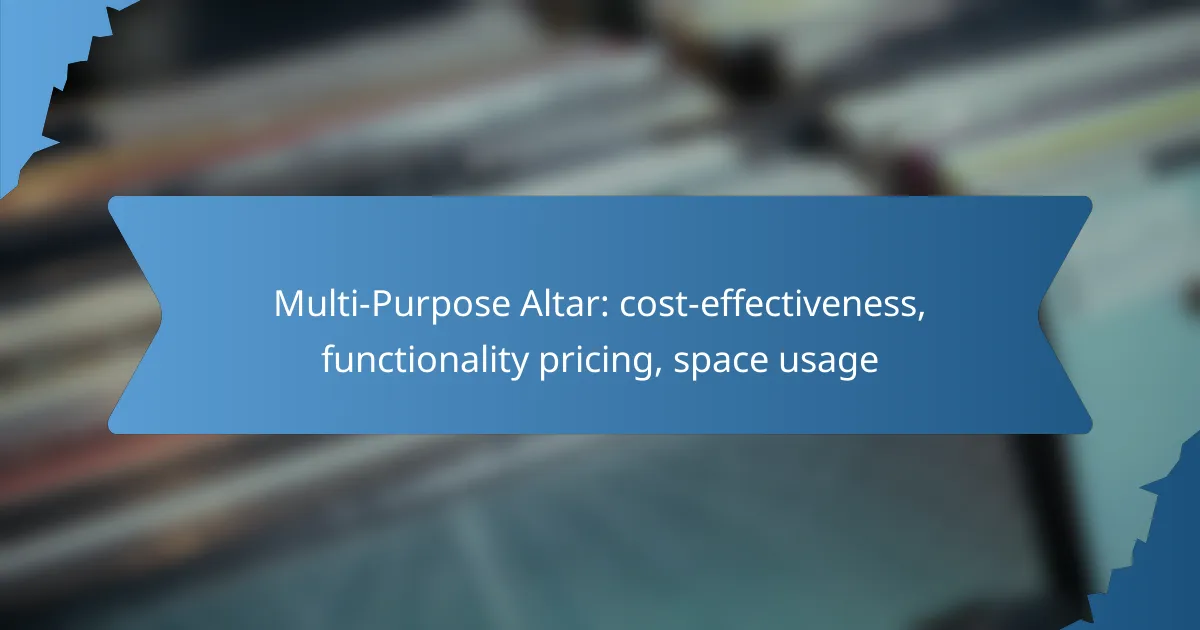A multi-purpose altar is an economical solution that combines versatility and functionality, catering to various spiritual and practical needs. By optimizing space and reducing material costs, it offers a unique blend of utility and adaptability, making it suitable for diverse aesthetic preferences. When pricing a multi-purpose altar, factors such as materials, design complexity, and intended use play a crucial role in achieving an effective balance between cost and functionality.

How cost-effective is a multi-purpose altar?
A multi-purpose altar is highly cost-effective, offering versatility and functionality at a reasonable price. By serving various spiritual and practical needs, it can save money on materials and space compared to traditional setups.
Affordable options under $200
Many multi-purpose altars are available for under $200, making them accessible for a wide range of budgets. Options include simple wooden designs, portable altar kits, and even DIY solutions that can be customized to fit personal preferences.
When shopping, consider materials like plywood or MDF, which are often more affordable yet durable. Look for sales or second-hand options to maximize savings.
Long-term savings on materials
Investing in a multi-purpose altar can lead to long-term savings by reducing the need for multiple specialized items. A single altar can accommodate various practices, eliminating the cost of separate altars for different purposes.
Additionally, many multi-purpose altars are designed with durable materials that withstand wear and tear, further decreasing the need for replacements or repairs over time.
Comparison with traditional altars
Traditional altars often require more space and investment, as they are typically designed for specific functions. In contrast, multi-purpose altars maximize space efficiency and can adapt to various rituals or practices.
While a traditional altar may offer a more specialized aesthetic, the flexibility of a multi-purpose altar can be more practical for those with limited space or budget constraints. This adaptability makes them a popular choice among modern practitioners.

What functionalities do multi-purpose altars offer?
Multi-purpose altars provide a range of functionalities that enhance their utility for various spiritual and practical needs. They serve as spaces for rituals, storage, and can be designed to fit different aesthetic preferences, making them both functional and adaptable.
Storage capabilities
Multi-purpose altars often include built-in storage options, allowing users to keep ritual items organized and easily accessible. This can range from drawers and shelves to hidden compartments, which help maintain a tidy appearance while maximizing space efficiency.
When selecting an altar, consider how much storage you need based on the items you plan to keep. A well-designed altar can accommodate everything from candles and incense to sacred texts and tools, ensuring that everything is within reach during rituals.
Adaptability for various rituals
These altars are designed to support a variety of spiritual practices, making them suitable for different rituals and ceremonies. Their adaptability allows users to easily modify the altar setup according to specific traditions or personal preferences.
For example, an altar can be configured for seasonal celebrations, daily meditation, or special ceremonies, depending on the user’s needs. This flexibility is a key advantage, as it allows for a personalized approach to spirituality without the need for multiple dedicated spaces.
Design versatility
Multi-purpose altars come in a wide range of designs, materials, and styles, catering to diverse aesthetic tastes and spiritual practices. Whether you prefer a minimalist wooden altar or a more ornate metal design, there are options to suit every preference.
When choosing an altar, consider how its design will fit into your existing space. Look for options that complement your home decor while providing the functionality you need. Customization options, such as color and finish, can also enhance the altar’s integration into your environment.

How to price a multi-purpose altar?
Pricing a multi-purpose altar involves considering various factors such as materials, design complexity, and functionality. Understanding these elements can help you find a balance between cost-effectiveness and the altar’s intended use.
Factors influencing pricing
Several factors can influence the pricing of a multi-purpose altar. The choice of materials, such as wood, metal, or composite materials, significantly affects the overall cost. Additionally, the altar’s size and design intricacy can lead to variations in pricing.
Functionality also plays a crucial role; altars designed for specific rituals or with integrated storage solutions may come at a premium. Custom features, like engravings or adjustable components, can further increase the price.
Average market prices
The average market prices for multi-purpose altars can vary widely. Basic models may start in the low hundreds of USD, while more elaborate designs can range from several hundred to over a thousand USD. It’s essential to compare different retailers to find the best value.
For example, a simple wooden altar might cost around 200-400 USD, while a larger, intricately designed altar could be priced between 800-1,500 USD. Always consider the quality and functionality when assessing prices.
Custom vs. pre-made options
Choosing between custom and pre-made options can significantly impact your budget. Pre-made altars are generally more affordable and readily available, making them a practical choice for those on a tighter budget. They often come in standard sizes and designs.
On the other hand, custom altars allow for personalization and can be tailored to specific needs, but they typically come at a higher cost. Depending on the complexity, custom designs can range from 500 to several thousand USD. Weigh the benefits of customization against your budget and requirements before making a decision.

What is the best space usage for a multi-purpose altar?
The best space usage for a multi-purpose altar involves maximizing functionality while minimizing the footprint. This means selecting a design that fits your available area and serves multiple purposes, such as storage, display, and ritual activities.
Optimal dimensions for small spaces
For small spaces, a multi-purpose altar should ideally have dimensions that do not exceed 3 feet in width and 2 feet in depth. This size allows for sufficient surface area for items while keeping the altar unobtrusive. Consider a height of around 30 to 36 inches to ensure comfortable access for various activities.
Utilizing vertical space can enhance functionality. Shelving above the altar can store supplies or decorative items, while drawers or compartments can hide away tools, keeping the area tidy.
Placement tips for functionality
When placing a multi-purpose altar, choose a location that is easily accessible yet private enough for reflection and rituals. Avoid high-traffic areas to minimize distractions. Ideally, the altar should be positioned near natural light sources to create a calming atmosphere.
Consider the flow of movement around the altar. Ensure there is enough space to walk around comfortably, and avoid placing it against walls unless necessary. This setup allows for better engagement during rituals or activities.
Multi-purpose altar designs for urban living
In urban living environments, compact and modular designs work best for multi-purpose altars. Look for foldable or extendable options that can be adjusted based on your needs. For example, a wall-mounted altar can be folded down when in use and stored away when not needed.
Incorporating storage solutions, such as baskets or bins, can help keep the altar organized. Choose materials that complement your decor and ensure the altar blends seamlessly into your living space, enhancing both aesthetics and functionality.

What are the prerequisites for choosing a multi-purpose altar?
Choosing a multi-purpose altar requires understanding your spiritual needs, assessing available space, and considering your budget. These factors will guide you in selecting an altar that is both functional and cost-effective for your practices.
Understanding your spiritual needs
Begin by identifying the specific spiritual practices you intend to use the altar for, such as meditation, prayer, or rituals. This clarity will help you determine the size, materials, and design that best suit your activities.
Consider the symbolism and items you wish to include, such as candles, crystals, or religious icons. A well-thought-out altar can enhance your spiritual experience and serve multiple purposes effectively.
Assessing available space
Evaluate the area where you plan to place the altar. Ensure that the space is conducive to your practices, providing enough room for movement and accessibility. Measure the dimensions to avoid overcrowding.
Think about the altar’s height and visibility. A multi-purpose altar should be easily accessible while fitting harmoniously within your chosen environment, whether it’s a dedicated room or a corner of a larger space.
Budget considerations
Establish a budget that reflects your financial capacity while considering the quality of materials and craftsmanship. Multi-purpose altars can range from affordable options in the low hundreds to more elaborate designs costing several thousand dollars.
Look for local artisans or online retailers that offer customizable options within your budget. Remember to factor in additional costs for items you plan to place on the altar, as these can add up quickly.

What are the emerging trends in multi-purpose altars?
Emerging trends in multi-purpose altars focus on versatility, sustainability, and space efficiency. These altars are designed to serve various functions, accommodating different rituals and practices while optimizing the use of available space.
Sustainable materials in altar design
Using sustainable materials in altar design is becoming increasingly popular as people seek eco-friendly options. Common materials include reclaimed wood, bamboo, and recycled metals, which not only reduce environmental impact but also add unique character to the altar.
When selecting sustainable materials, consider durability and maintenance. For example, bamboo is lightweight and resistant to moisture, making it suitable for indoor and outdoor use. Reclaimed wood can offer a rustic aesthetic while being sturdy enough for regular use.
Additionally, sourcing materials locally can further enhance sustainability. This practice reduces transportation emissions and supports local economies. Look for suppliers who prioritize eco-friendly practices and certifications.
